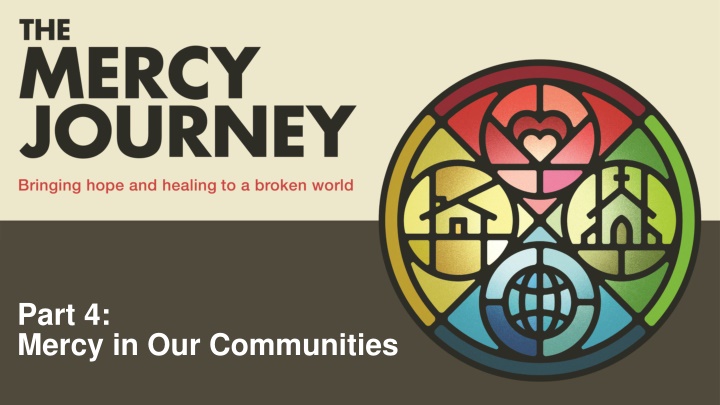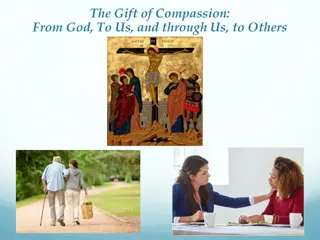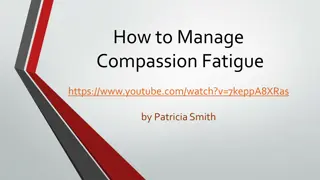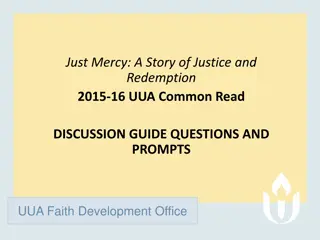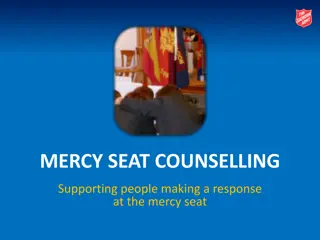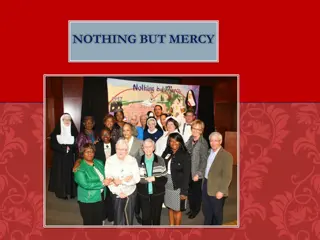The Mercy Journey: Restoring Creation Through Compassion
The purpose of the gospel is not just waiting for heaven but actively restoring creation by bringing mercy, compassion, and justice to our communities. The Parable of the Good Samaritan emphasizes the importance of showing mercy to others, regardless of differences. Through acts of kindness and compassion, we embody the teachings of Jesus and fulfill our calling to love our neighbors as ourselves.
Download Presentation

Please find below an Image/Link to download the presentation.
The content on the website is provided AS IS for your information and personal use only. It may not be sold, licensed, or shared on other websites without obtaining consent from the author.If you encounter any issues during the download, it is possible that the publisher has removed the file from their server.
You are allowed to download the files provided on this website for personal or commercial use, subject to the condition that they are used lawfully. All files are the property of their respective owners.
The content on the website is provided AS IS for your information and personal use only. It may not be sold, licensed, or shared on other websites without obtaining consent from the author.
E N D
Presentation Transcript
Part 4: Mercy in Our Communities
The Mercy Journey Mercy in Our Communities: Bringing mercy, offering compassion and enacting justice in the world around us
The purpose of the gospel is restoring creation, taking the things that are falling apart and bringing them back together. Meeting psychological, social and physical needs. You re not saved by doing that, but you are saved to do that. Without the business of restoration, you re just waiting for heaven, and that s a very reductionistic understanding of the Christian life. [Timothy Keller, from The Mercy Journey]
The Parable of the Good Samaritan is Jesus charge to his people to be merciful to others.
One day an expert in religious law stood up to test Jesus by asking him this question: Teacher, what should I do to inherit eternal life? Jesus replied, What does the law of Moses say? How do you read it? The man answered, You must love the Lord your God with all your heart, all your soul, all your strength, and all your mind. And, Love your neighbor as yourself. Right! Jesus told him. Do this and you will live! The man wanted to justify his actions, so he asked Jesus, And who is my neighbor? [Luke 10:25-29]
Jesus replied with a story: A Jewish man was traveling from Jerusalem down to Jericho, and he was attacked by bandits. They stripped him of his clothes, beat him up, and left him half dead beside the road. By chance a priest came along. But when he saw the man lying there, he crossed to the other side of the road and passed him by. A Temple assistant walked over and looked at him lying there, but he also passed by on the other side. [Luke 10:30- 32]
Then a despised Samaritan came along, and when he saw the man, he felt compassion for him.Going over to him, the Samaritan soothed his wounds with olive oil and wine and bandaged them. Then he put the man on his own donkey and took him to an inn, where he took care of him.The next day he handed the innkeeper two silver coins,telling him, Take care of this man. If his bill runs higher than this, I ll pay you the next time I m here. [Luke 10:33-35]
Now which of these three would you say was a neighbor to the man who was attacked by bandits? Jesus asked. The man replied, The one who showed him mercy. Then Jesus said, Yes, now go and do the same. [Luke 10:36-37]
Who is my neighbor? Jesus reminds us that showing mercy is not just for those in our circle, but for those who never assume they could be part of it. So Jesus widened the circle. [Rusty George, Justice. Mercy. Humility.]
Who is my neighbor? 1. The hurting and the helpless 2. The ignored and forgotten 3. The least likely
Who is my neighbor? Love your neighbor as yourself is a command that reaches out beyond the circle of friends and fellow Christians we meet on a regular basis. It is a call to show mercy to all the unfortunate people lying beside the Jericho road of human life. And it is a cry to affluent nations to alleviate the suffering and poverty countless people experience in underdeveloped countries. [Simon J. Kistemaker, The Parables]
Four Ways the Samaritan Demonstrated Mercy 1. He saw the man in need and had compassion Then a despised Samaritan came along, and when he saw the man, he felt compassion for him. [Luke 10:33]
Four Ways the Samaritan Demonstrated Mercy 1. He saw the man in need and had compassion 2. He went to the man and took care of his needs Going over to him, the Samaritan soothed his wounds with olive oil and wine and bandaged them. Then he put the man on his own donkey and took him to an inn, where he took care of him. [Luke 10:34]
Four Ways the Samaritan Demonstrated Mercy 1. He saw the man in need and had compassion 2. He went to the man and took care of his needs 3. He counted the cost and paid it The next day he handed the innkeeper two silver coins, telling him, Take care of this man. If his bill runs higher than this, I ll pay you the next time I m here. [Luke 10:35]
Four Ways the Samaritan Demonstrated Mercy 1. He saw the man in need and had compassion 2. He went to the man and took care of his needs 3. He counted the cost and paid it 4. He showed a commitment to the man s complete healing Take care of this man. If his bill runs higher than this, I ll pay you the next time I m here. [Luke 10:35]
When asked whose responsibility it is to care for those who are in need, less than one in six practicing Christians feels they personally have a primary obligation to help, either in person or by donating money and other resources (17% for each, on average). Rather, the plurality of practicing Christians feels that churches and other Christian organizations and nonprofits should shoulder the responsibility to provide for various groups or causes. [Barna Group, The Mercy Journey]
Jesus shares the Parable of the Good Samaritan not just so well identify with the Samaritan s act of mercy, but rather so we ourselves will imitate it. The question, now as then, is whether we will use all that Jesus is telling us here about love and grace as a call to extend that love and grace to the whole world. No church, no Christian can remain content with living life in a way that allows us to watch most of the world lying half-dead in the road and pass by. [N.T. Wright, Lent For Everyone: Luke]
The Mercy Journey: how do we continue our own journey? 1. Pray: Ask the Holy Spirit to open your eyes to opportunities to be an instrument of mercy 2. Invest: Prioritize generosity and service to others as a way to honor God with our time and resources 3. Act: Don t stop at merely seeing a need; rather, stop and provide care
The rule for all of us is perfectly simple. Do not waste time bothering whether you love your neighbor; act as if you did. As soon as we do this we find one of the great secrets. When you are behaving as if you loved someone, you will presently come to love him. [C.S. Lewis, Mere Christianity]
